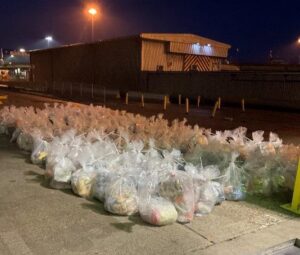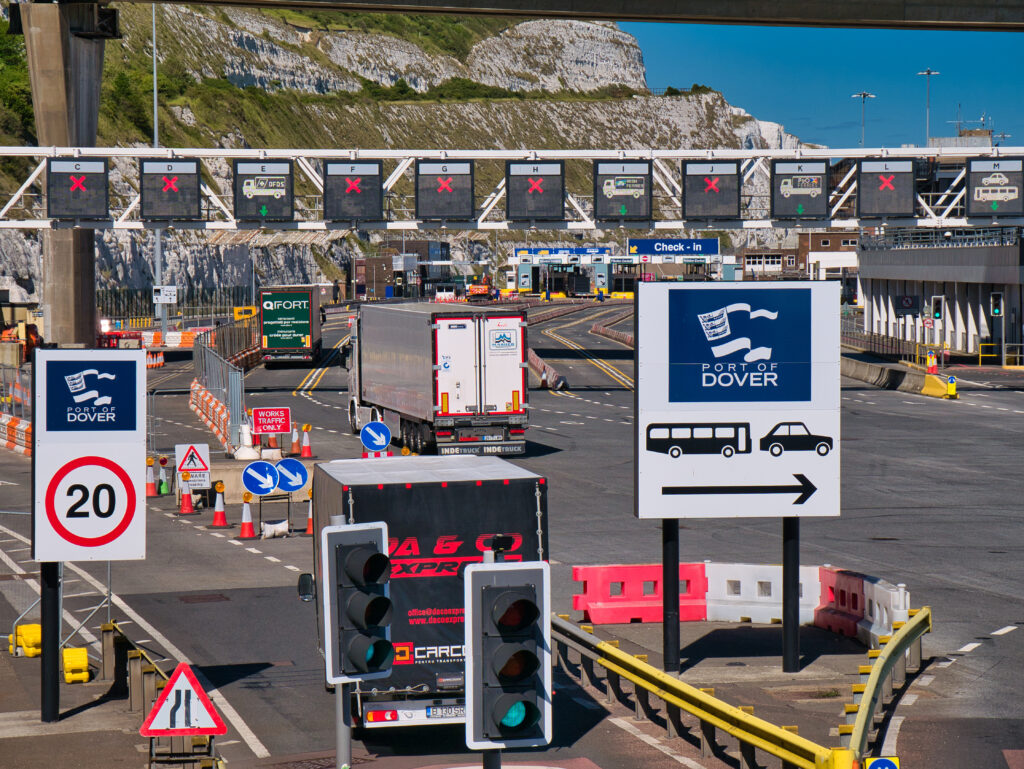The chair of the Environment, Food and Rural Affairs Committee, Sir Robert Goodwill, has written to Defra Secretary Steve Barclay to express ‘serious concerns’ over Defra’s plans to cut the budget for checks of illegal meat imports at Dover.
The first phase of the Government’s Border Target Operating Model (BTOM) finally comes into force on Wednesday, January.
However, as first reported by Pig World, serious concerns have been raised about the changes this will entail. These include proposed cuts of up to 70% in the budget for illegal meat checks at the Port of Dover, specifically introduced to keep African swine fever (ASF) out of the country, and a decision to move the Border Control Post for customs checks from Dover 22 miles inland to a site at Sevington, near Ashford.
In the letter to Mr Barclay, Sir Robert said the Committee remains supportive of the implementation of the BTOM. However, the letter highlighted MPs’ concerns over the budget cuts and the move to Sevington.
It highlighted how the Dover Port Health Authority and Border Force are currently confiscating large amounts of illegal meat, smuggled into Great Britain via the Port of Dover. Since September 2022, when the ASF checks were introduced, more 60 tonnes of illegal pork have been seized, with 5.5. tonnes of illegal meat confiscated over the weekend before Christmas alone. DPHA has stressed that this is ‘the tip of the iceberg and these controls need to be bolstered and not reduced’.
The Committee also cited the DPHA’s comments that the cuts in funding ‘will have a catastrophic effect’ on biosecurity and its calls for Defra to abandon its plans.

In the letter, Sir Robert asks the Defra Secretary for confirmation of ‘the current amount of funding in place for spot checks of POAO at the Port of Dover and whether [they] have plans to change that funding.’ The letter asks what assessment Defra has made of the potential impact of a reduction in funding on checks on the UK’s biosecurity.
The letter then raises the issue that the border control post at Sevington will require vehicles to travel 22 miles unsupervised across Kent, ‘presenting potentially serious biosecurity risks, and also compromising compliance’. The Committee understands that drivers will be under no obligation to go to Sevington, if asked to do so.
Sir Robert said the Committee ‘have real and reasonable concerns about the geographic dislocation of the border control post from the point of entry’ and asked the Secretary of State to confirm what ‘safeguards will be in place to ensure the required loads travel from the point of entry (Port of Dover) to the Sevington site (22 miles away), without either offloading goods on route or not presenting at Sevington at all’.
The Committee asks for the Department’s ‘rationale for persisting with the plans to open the Sevington inland border facility despite stakeholder concerns.’ Given that the plan is for Sevington to be used as the site for checks, the letter also asks Defra to confirm what its intentions are for the Bastion Point Inland Border Facility in Dover.
Potentially disastrous

Lucy Manzano, head of port health & public protection at the council, described the cuts as potentially ‘disastrous’ for the UK pig sector.
At the same time, DPHA is also being asked to extend this work to Coquelles, where the Channel Tunnel starts in France, a key risk point for the illegal meat trade and described by Ms Manzano as ‘an open door’.
“So, they want us to do twice the work in two different locations, with Coquelles presenting far more significant challenges, with a significantly reduced budget,” she told Pig World.
“We are really aware that this is a critical risk to UK biosecurity, our farming industry and our pig stocks. An ASF outbreak would be catastrophic in terms of export bans, culling and reputational damage. And we are shocked that, rather than put more robust controls in place, Government is proposing a 70% cut. This is the pinch point for this trade.”
NPA chief executive Lizzie Wilson said cutting the budget for the ASF work at Dover could be ‘catastrophic’ for the pig sector.
“Rather than slashing funding, we continue to push for more resources to be made available for this absolutely critical work that could actually save the taxpayer millions in the long run. We are also asking the Government to remove the 2kg threshold on illegal pork imports, so it’s easier for the public to understand and easier to enforce,” she said.
Shadow Farming Minister Daniel Zeichner said cutting funding to those trying to stop this illegal trade would be ‘both foolish and dangerous’. “The seizures at Dover are deeply troubling, not least because the experts consider that much more is passing through. That puts us all at risk, but particularly the pig sector which is vulnerable to ASF,” he said.
Brittish Meat Processors Association chief executive Nick Allen said cutting back of resources at Dover would be ‘extremely concerning from a disease threat point of view’. “From what we have seen, there is no doubt that it’s coming from areas that have potentially got ASF, and that this is just the tip of the iceberg,” he said.
British Veterinary Association President Anna Judson said the reports about the scale of the Dover illegal meat seizures were ‘deeply concerning and highlight the serious risk posed to the UK’s biosecurity from imported diseases like ASF and FMD.
Defra didn’t respond directly to queries over the Dover budget cuts. A Government spokesperson said: “We have strict border controls in place to protect food and animal health safety – and these, along with our high biosecurity standards, remain unchanged.”
Commenting on the BCP move to Sevington, he added: “Work is underway with the Food Standards Agency to ensure there are robust procedures in place for goods arriving at Sevington to ensure there is absolutely no compromise on food safety or biosecurity.”




